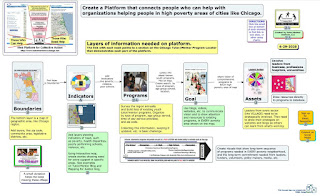A few days ago I watched an introduction to Chicago's Violence Reduction Dashboard which was created by the University of Chicago's Urban Crime Lab. Below I'm showing a few images I made from the video. Click on the images to enlarge them.
The two images below show the data plotted on a Tableau GIS platform. The first show the entire city and the second illustrates how you can zoom in to look at a smaller section. The data sorts by zip code, aldermanic ward, community area, etc.
View the video below and you'll see how the above images are from the dashboard.
While this Mapping For Justice blog is fully focused on maps and visualizations, the Tutor/Mentor blog shows uses of maps as part of the larger strategy of helping kids in high poverty areas that I launched in 1993, and have supported through the Tutor/Mentor Institute, LLC since 2011. Here's one example.
View the video below and you'll see how the above images are from the dashboard.
While this Mapping For Justice blog is fully focused on maps and visualizations, the Tutor/Mentor blog shows uses of maps as part of the larger strategy of helping kids in high poverty areas that I launched in 1993, and have supported through the Tutor/Mentor Institute, LLC since 2011. Here's one example.
I wish I had this type of functionality in the 1990s and 2000s! Over a period of 16 years I mixed together volunteer and paid talent to create maps and map-stories intended to show where volunteer-based tutor/mentor programs were most needed in the Chicago region and why. By 2009 when the interactive Chicago program locator was built the financial crisis had hit and we lost our funding and ultimately the capacity to continue to update the program locator and create map stories.
The concept map below shows my 30 year history of using data maps. You can find the link to it in this article.
This graphic visualizes my goal in using maps and it's one I hope others who now have this capacity will adopt.
Creating data dashboards that help people understand the distribution of problems within a big city like Chicago and keeping those updated is a huge challenge. However, unless layers of information are added that show organizations working in different places who are constantly looking for volunteers, donors, talent, technology and ideas to do good work, the maps are not connecting "people who can help" with "places where help is needed".
They are missing a big opportunity to be part of the solution.
And if this role is not taken by many leaders there will always be a few great organizations in a few places, but too few great organizations in all the places they are needed, because of the competition for scarce resources.
Below is a concept map that I created to show layers of information that I'd love to see on these data maps, along with strategies that get more people to view and use the information. See it in this article.
In mid 2011 when I created the Tutor/Mentor Institute, LLC in order to keep the Tutor/Mentor Connection available in Chicago. As I wrote above, I lost the funding and capacity to continue building and maintaining my own program locator. However, in the 14 years since then I've pointed to data platforms built by others that could be used to create map stories that draw volunteers and donors to tutor/mentor programs in high poverty/high violence areas of Chicago and other places.
I hope you'll take a look. I hope donors will provide you with the funding to build and maintain this capacity.
There's too much information on my blog and website for a quick review. Unless someone keeps referring to the information, they way college students review course material, or faith group review religious texts, too few people will build the understanding needed apply the ideas I'm sharing.
That's why I keep encouraging wealthy donors to fund the creation of Tutor/Mentor Connection-type programs on college campuses, where my archives can serve as study material, intended to build the new leaders needed to build the technology and apply these ideas.
Thanks for reading. Please share this with your network and connect with me on LinkedIn, Facebook, BlueSky, Instagram, Mastodon and Threads (see links here).
That's why I keep encouraging wealthy donors to fund the creation of Tutor/Mentor Connection-type programs on college campuses, where my archives can serve as study material, intended to build the new leaders needed to build the technology and apply these ideas.
Thanks for reading. Please share this with your network and connect with me on LinkedIn, Facebook, BlueSky, Instagram, Mastodon and Threads (see links here).
If you value what I'm sharing and are able, please visit this page and make a contribution to help fund my work.








